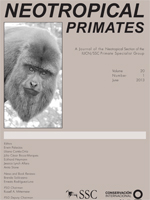Intestinal parasite diversity was evaluated in two groups of free-ranging Callicebus modestus from the José Ballivián Province of the Beni Department, Bolivia. During 10 months (September 2010 to June 2011) fecal samples were collected from an adult pair (group A), and a second group (group B) living in a less fragmented area than group A composed by an adult pair, a juvenile female and an infant male. Immature structures from parasites belonging to the Strongylida and Spirurida orders and the Strongyloides and Bertiella genera were detected through coproparasitology. Eggs from Strongyloides spp. were the most prevalent along the study (present in 9 of 10 months), followed by Strongylida eggs (present in 6 of 10 months). Immature structures of parasites from the Spirurida order and the genera Bertiella were only observed at the end of the rainy season. None of the monitored individuals presented evidence of health problems related to the presence of parasites, however, the presence of Bertiella spp. eggs is relevant for its public health implications.
How to translate text using browser tools
1 December 2013
Primer Reporte de Parásitos Intestinales en Callicebus modestus del Departamento de Beni, Bolivia
José Luis Mollericona,
Jesús Martínez,
Rolando Limachi,
Pamela Carvajal,
Erika Alandia-Robles

Neotropical Primates
Vol. 20 • No. 1
June 2013
Vol. 20 • No. 1
June 2013
Bolivia
Callicebus modestus
free-ranging primates
intestinal parasites
Parásitos intestinales
primates silvestres




